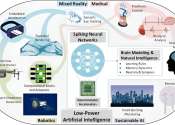World first as artificial neurons developed to cure chronic diseases
Artificial neurons on silicon chips that behave just like the real thing have been invented by scientists—a first-of-its-kind achievement with enormous scope for medical devices to cure chronic diseases, such as heart failure, ...
Dec 3, 2019
1
18598









